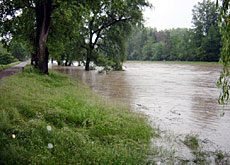Flooding cuts rail and road networks

Torrential rain has unleashed landslides and floods in Switzerland, cutting off villages, and bringing rail and road traffic to a standstill.
Central Switzerland, especially canton Lucerne where two firefighters were killed and nearly 1,500 people evacuated, was the most affected region.
Flooding stretches from the Bernese Alps in central Switzerland to the city of St Gallen in the northeast, as rivers burst their banks and lakes overflowed.
Two firefighters were killed by a mudslide during the night in the Entlebuch region in canton Lucerne. The area remains cut off after roads and rail tracks were flooded.
Lucerne police said in a statement there had been several landslides in the Entlebuch, while the Reuss and Emme rivers had burst their banks. The towns of Emmen, Wohlhusen, Malters and Emmenbrücke were all facing rising waters on Monday morning.
In the city of Lucerne, power, gas and phone connections worked intermittently. Flooding closed roads around the town and in much of the canton.
In canton Obwalden, local authorities in Sarnen warned the population to stay on the upper floors of buildings and to be prepared for an evacuation.
The Aare river also burst its banks in the capital Bern, flooding the Matte neighbourhood and reaching the nearby zoo.
In canton Aargau, the situation was described as “critical” by the authorities, especially along the Reuss valley. Navigation along the Rhine was brought to a standstill.
Trains cancelled
The Federal Railways advised against travelling in central Switzerland and said numerous train links, including most of those connecting Lucerne, were cut.
The main north-south line through the Gotthard tunnel leading to and from canton Ticino and Italy was shut down by the weather.
Trains on the Bern-Lötschberg railway ground to a halt on Monday afternoon, after the railway had managed to get a reduced service up and running in the morning. Its services link the Bernese Oberland with the south side of the Alps, which was not badly affected by the wet weather.
Some regional train companies in canton Bern and central Switzerland were forced to cut services.
Goods trains have also been cancelled. It has not been possible to transfer merchandise to the road, given that many of the country’s motorways and main roads have also been cut off or overloaded by traffic.
Roads cut
Travel information service Viasuisse estimated that up to 50 roads had been closed or partially blocked, with cantons Lucerne, Obwalden, Nidwalden, Schwyz and the Bernese Oberland bearing the brunt of the disruptions.
The worst affected highways on Monday were the A4 motorway between Küssnacht and Goldau, the A14 between Rotsee and Gisikon-Root, the A6 between Muri and Rubigen and the A8 between Interlaken and Spiez. These routes were closed in both directions.
To make matters worse, many minor roads, particularly around the A4, have also been closed, making it difficult for motorists to find alternative routes.
Up to 110mm of rain fell in parts of central and western Switzerland by Sunday and more wet weather has been forecast.
Viasuisse advised travellers in the most badly affected regions to stay at home if at all possible or to seek information about the state of roads and rail links before setting off on journeys.
A spokeswoman said the weather-related problems were the worst since the organisation started in 2001.
swissinfo with agencies
Two firefighters were killed and 1,500 people evacuated because of torrential rains over the weekend.
Since the 1970s, natural catastrophes have claimed the lives of nearly 100 people in Switzerland.
The damage caused by avalanches, flooding and landslides is estimated to have cost more than SFr9 billion ($7.08 billion).

In compliance with the JTI standards
More: SWI swissinfo.ch certified by the Journalism Trust Initiative











You can find an overview of ongoing debates with our journalists here . Please join us!
If you want to start a conversation about a topic raised in this article or want to report factual errors, email us at english@swissinfo.ch.